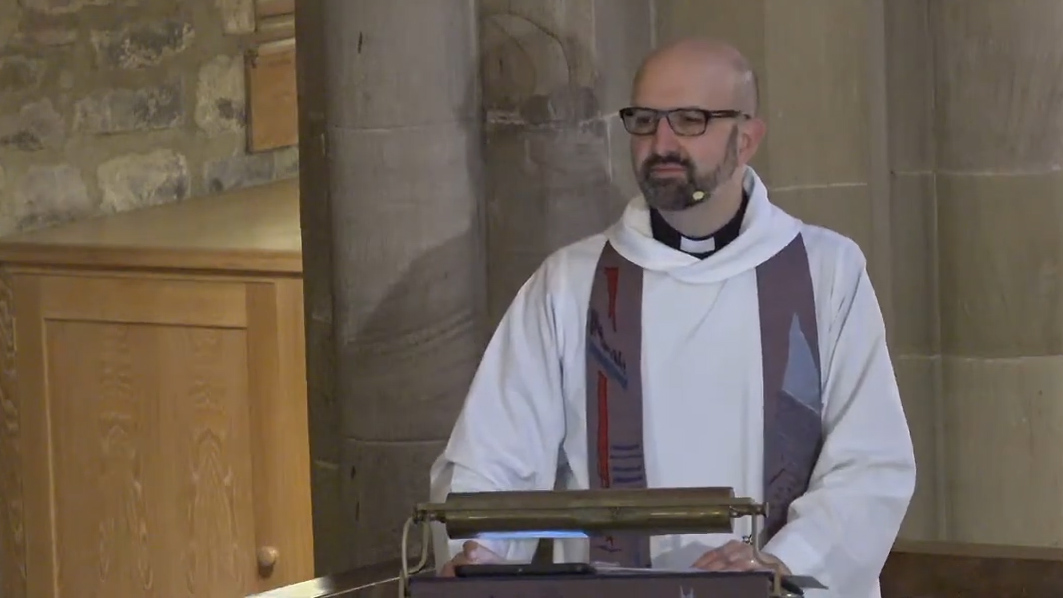Isaiah 7.10-16; Matthew 1.18-end
Preached by the Revd Pete Gunstone, Interim Precentor
Introduction
Introduce self, pray.
Focus on the reading from Isaiah 7 – do turn to it in your service sheets.
Where are we?
We are in the eighth century BC. King Ahaz is the king of Judah.
What is going on?
Ancient Israel has split in two kingdoms: Israel, to the north; Judah, to the south. In short, there was a significant disagreement between them about leadership and there is ongoing enmity.
Israel, the northern kingdom, and Syria are desperately seeking to draw their neighbours into an alliance against the all-conquering Assyria. When Judah, the southern kingdom, refuses, Israel and Syria arrive to depose Ahaz and replace him with their own man. This possible change of Judah’s leadership threatens its very existence. We join the story at this crunch point in the story of Judah.
What is the word of the Lord in this situation?
Just before the extract of Isaiah that we heard read this morning, the Lord has spoken to Ahaz through Isaiah. In summary, the Lord says to Ahaz that he has nothing to fear as his enemies are nothing but “smouldering stumps”, or the stub of a cigarette and that nothing will come of this cage rattling. So, Ahaz needs do nothing except stand firm and have faith in the Lord. Indeed, the Lord says to Ahaz:
“If you do not stand firm in faith,
you shall not stand at all.” (Isaiah 7.9b)
“If you do not stand firm…” Here, the call to have faith in God is a call to the will. What Ahaz does and what we do is the surest exposition of our faith. In any given moment, with whom are we choosing to keep faith?
My favourite example of this is in Indiana Jones and the Last Crusade. Approaching the climax of that film, the title character faces a series of challenges as he seeks the grail, guided by clues in his father’s diary. The third challenge presents Indiana with a giant chasm, one that appears uncrossable at first sight. Does he choose to keep faith with his father’s guidance at this point by choosing to take a leap of faith, or does he cast the diary into the chasm and turn back? Spoiler alert! Here, although he cannot see a safe way across the chasm, he steels his will, trusts in the clues left in his father’s diary, and steps out into the unknown…only to find an invisible bridge.
So, back in Isaiah 7, today’s passage, what happens next? What does Ahaz do?
Well, it’s crunch time for Ahaz. Will he choose to have faith in the Lord? Or will he choose another option?
From verse 10, we read:
10 Again the Lord spoke to Ahaz, saying,
11 Ask a sign of the Lord your God; let it be deep as Sheol or high as heaven.
12 But Ahaz said,
I will not ask, and I will not put the Lord to the test.
“I will not ask, and I will not put the Lord to the test.” Whilst it could be argued that this is an honourable position to take, one in which the Lord is not put to the test, one in which the Lord’s reputation is not put at risk this amounts to little more than a flat rejection of the Lord. It’s a bit like Indiana Jones chucking his father’s diary away.
However, there’s more to this story. In this moment of rejection, Ahaz chooses an alliance with and fidelity to Assyria in the place of God. Yes, Assyria, was a great nation – but what kind of ally would they prove to be? Protection treaties don’t come cheap, and you can read on beyond v16 to hear the Lord’s assessment of how Judah’s future relationship with Assyria will go.
But what happens next? What happens once Ahaz has broken faith with God in place of the local superpower?
Unsurprisingly, as I’ve mentioned, God’s response to the situation includes a judgement of how badly this choice is going to work out for Ahaz. But, surprisingly, that announcement of judgement is preceded by an announcement of salvation, a promise of one to come who will be Immanuel, literally “God with us”. And this promise is made not to Ahaz, but to the “house of David”, which is another name of the nation of Judah.
Let’s read from verse 13:
13 Then Isaiah said:
‘Hear then, O house of David! Is it too little for you to weary mortals, that you (pl.) weary my God also? 14 Therefore the Lord himself will give you a sign (because you can’t be bothered to consult with him). Look, the young woman is with child and shall bear a son, and shall name him Immanuel. 15 He shall eat curds and honey by the time he knows how to refuse the evil and choose the good. 16 For before the child knows how to refuse the evil and choose the good, the land before whose two kings you are in dread will be deserted.
If, this morning, you’re either here or are watching online for the first time, and you want to know who this God is that we believe in and why we go to all this fuss of doing what we do – here it is: even when we are far from God and not even looking his way, he is making promises to us about our future.
Ahaz has messed up, big-style, and his nation, Judah are about to bear the consequences. In that moment, where Ahaz has turned his back on the faith of his forefathers, where he has not even bothered to ask God for a sign because he’s decided that his best bet is in some phoney treaty, in that moment, you could forgive God for going off in a big huff and throwing his cosmic toys out of the pram, perhaps directly at Ahaz. But, in that moment, God reveals himself to be oh-so-much bigger and better than that, so much more loving than we might care to imagine. In that moment, God holds out a promise of a better future, a future that better than the survival of Judah, a future that is the best possible outcome of the current circumstances. God holds out the promise of one being born whose presence will be accompanied by “curds and honey” – signs of natural plenty – and a time of peace. Moreover, the one to be born will be one who – unlike king Ahaz – will refuse evil and choose the good.
This is the heart of the gospel, that when we turn our faces away from God, he has already turned his face towards us. It’s as simple as that, and that’s why it is gospel – good news.
Secondly, a briefer look at today’s gospel reading – a reading which apparently will contain “good news”.
18 Now the birth of Jesus the Messiah took place in this way.
When his mother Mary had been engaged to Joseph, but before they lived together, she was found to be with child from the Holy Spirit.
19 Her husband Joseph, being a righteous man and unwilling to expose her to public disgrace, planned to dismiss her quietly.
Where are we?
Well, we’ve fast-forwarded 7 or so centuries. We’re still with the “house of David” – Joseph is of that house, and the spoiler is that we’re at the point when the prophecy that we have just read is about to be fulfilled.
But, there’s a twist…
Mary’s pregnancy not by Joseph threw her future and the future of her unborn child in jeopardy. Engagement was a binding contract and unchastity was a breach of that contract, the consequence of which had been relaxed from stoning to divorce by this point in time. Divorce then would leave you in horrendous circumstances, rejected by your family, cast out of the safety of the settlement, and left to raise the child on your own and to fend for yourself. This doesn’t seem like good news to Mary, in my view.
However, despite a divorce being not just the default course of action but a righteous one, and despite a quiet divorce being a compassionate means of fulfilling this, God sends an angel to intervene and direct Joseph to take a different and culturally shocking course of action. In a few words, the angel redefines this otherwise apparently shameful pregnancy as a step towards the fulfilment of this long-awaited prophecy:
[20 But just when he had resolved to do this,] an angel of the Lord appeared to him in a dream and said, ‘Joseph, son of David, do not be afraid to take Mary as your wife, for the child conceived in her is from the Holy Spirit. 21 She will bear a son, and you are to name him Jesus, for he will save his people from their sins.’
[22 All this took place to fulfil what had been spoken by the Lord through the prophet:
23 ‘Look, the virgin shall conceive and bear a son,
and they shall name him Emmanuel’,
which means, ‘God is with us.’]
So what did Joseph do? In Joseph’s actions, we see his faith in God.
24 When Joseph awoke from sleep, he did as the angel of the Lord commanded him; he took her as his wife, 25 but had no marital relations with her until she had borne a son; and he named him Jesus.
In contrast to his ancestor, Ahaz, Joseph remains true to the faith of the House of David, and does exactly as God has encouraged him to do, in spite of the certain shame and losing of face that will come his way on account of Jesus not being his biological child.
In conclusion, I’d like to leave you with a couple of questions:
Firstly, what do your actions demonstrate your faith in God to be?
Secondly, what do Jesus’ actions say about his faith in you?
Pray.
If these are questions that you’d like to discuss with others, I encourage you to speak with someone – perhaps the person next to you, perhaps those who gather for the “just a minute” discussion over there after the service, or perhaps with myself or one of the other clergy. If you have lots of questions that you’d like to ask of Jesus and those who follow him, or would appreciate being a part of such discussions, do consider joining the upcoming Alpha Course which is taking place on Tuesdays at 8pm from January 17 on site here in the de Lacy Centre.

